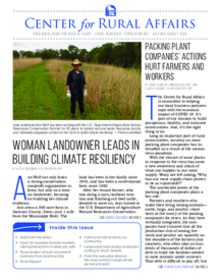Editor's note
The first value of the Center for Rural Affairs is “RESPONSIBILITY placed upon each of us to contribute to our community and society.” So, when COVID-19 hit the communities we live and work in, our staff each felt responsible to continue the work we do to support rural America.
Mid-March, each of us started working from our homes and we quickly pivoted to online technology. We postponed in-person learning circles, community meetings, small business trainings, and moved those to the internet.
Some of our work looks different. One piece is evident in this newsletter. We have travel restrictions in place so we can’t get out and take photos. The photos we are using have been taken prior to the pandemic or are submitted.
Other work, such as state legislative sessions, stalled. Conferences were cancelled or moved to rigorous one-day virtual events. On the other hand, projects ramped up. Small businesses need our help now more than ever. Producers who primarily sell to schools or farmers markets are looking for direction. Workers in meatpacking plants are getting sick. We were there to help, and will stand alongside you in the future.
Our organization—staff and board included—will continue to support rural America through whatever is thrown our way. We have a responsibility to do so.
Inside this issue
Woman landowner leads in building climate resiliency—Ann Wolf not only leads a strong conservation nonprofit organization in Iowa, but also as a woman landowner, focusing on building her climate resiliency. Ann owns a 300-acre farm in Jackson County, Iowa—just 1 mile from the Mississippi River. The land has been in her family since 1943, and has been a conventional farm since 1862.
Packing plant companies’ actions hurt farmers and workers—The Center for Rural Affairs is committed to helping our local business partners cope with the economic impact of COVID-19. It’s part of our mission to build prosperous, healthy, and inclusive communities. And, it’s the right thing to do.
From the desk of the executive director: we must confront racism where we live and work—The death of George Floyd at the hands of police has ignited a movement. Floyd’s senseless and brutal death is yet another chapter in a long history of racism in our country.
Open for business: farmers markets taking precautions to keep you safe—Rural farmers markets play an important social and cultural role in addition to helping connect food providers and consumers.
Rural location should not prevent business from receiving help—While states are beginning to reopen in the midst of the coronavirus pandemic, businesses are still hurting. They will be for some time.
Farm to School Enriches Our Community—Due to COVID-19, local foods have become a buzzword. More farmers are utilizing direct to consumer marketing strategies to reach customers through online sales, community-supported agriculture (CSAs), and farmers markets. Is there room for schools in these markets?
Large-scale solar energy production coming to South Dakota—South Dakota’s solar industry is poised for significant growth as a result of two proposed utility-scale solar energy construction projects.
Rural Rapport - Facebook Live—Join us each Tuesday at noon for our Facebook Live series, Rural Rapport. Each week, a Center staff member will share a resources and information on a range of topics.


